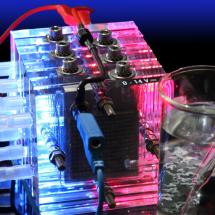
|
Chemistry and Chemical Technologie (double degree)
Doctoral Programme,
Faculty of Chemical Technology
Joint study programme with foreign universities - two diplomas for one study.
The programme is aimed at cooperation with the Slovak University of Technology in Bratislava, (STU Bratislava) and with KU Leuven, Belgium to educate highly qualified professionals at the highest level of higher education (doctoral level), both with advanced theoretical knowledge and practical skills in applied chemistry and chemical technology. Students extend their theoretical knowledge of chemistry, physical chemistry and chemical engineering. This knowledge is further developed by means of an independent professional work in the field of chemical technology, which allows the students to deepen theoretical knowledge and to gain experience with their application in the implementation of a specific technological project. The scientific education further includes a chemical-technological research project that leads to obtaining the original published knowledge of a general nature. CareersA graduate of the programme is fully qualified to occupy a leading position in the field of design, development and optimization of chemical technologies as well as for the management of chemical operations, distribution and application of chemical products on the market. The graduate is able to assess the environmental impacts of these activities and human health. He/she is also fully prepared and qualified for independent research and development activities in the field of chemical technologies using both a broad theoretical basis, as well as own experience in obtaining experimental and theoretical data, their critical evaluation and processing and drawing conclusions of a general nature. Programme Details
Ph.D. topics for study year 2026/27Galvanically deposited electrocatalytic layers in water alkali electrolysis
AnnotationThe aim of this project is the development of an efficient electrocatalyst for cathodic hydrogen evolution reaction (HER) in an alkaline environment. Developed catalyst will be based on galvanic modification of the appropriate substrate by non-Pt elements of transition metal group. After identification of the substrate, optimal coating’s properties and deposition method the technique will be transferred to the 3D porous electrodes to enhance process efficiency and tested in a laboratory and pilot scale alkaline water electrolysis cell. Mixed matrix mambranes for gas separation
AnnotationGas membrane separation represents the perspective and energy-saving alternative with respect to the present separation processes (PSA, TSA, amine extraction, rectification, etc.). Most of the membranes industrially applied are based on polymeric materials having low permeability and/or selectivity. In the frame of this work the mixed matrix membranes combining the perspective properties of both, microporous and polymeric membranes, will be prepared and characterized. The microporous material e.g. ZIF-8, silicalite-1, ETS, FAU, TS-1, AFX, MOF, or their post-synthesis modified variants will be used as filler, and combined with polymeric matrix based on newly synthesized and/or industrially available polymers. The aim of this study is the preparation and characterization of membranes for different industrial applications. The target application will be defined upon agreement based on the actual research carried out in cooperating laboratories (e.g. processing of exhaust gases from power plants and other industrial processes, separation of CO2 from biogas, separation of H2 from streams containing CO2 and/or hydrocarbons, separation of hydrocarbons, etc.). In the frame of this work, the problematics of polymer-filler interactions and the development of new materials aiming to increase the thermal and chemical stability, selectivity, and permeability of prepared membranes will be studied. |
|||||||||||||||||||||||||||||||||||||||||||||||
Updated: 21.1.2022 15:24, Author: Jan Kříž

